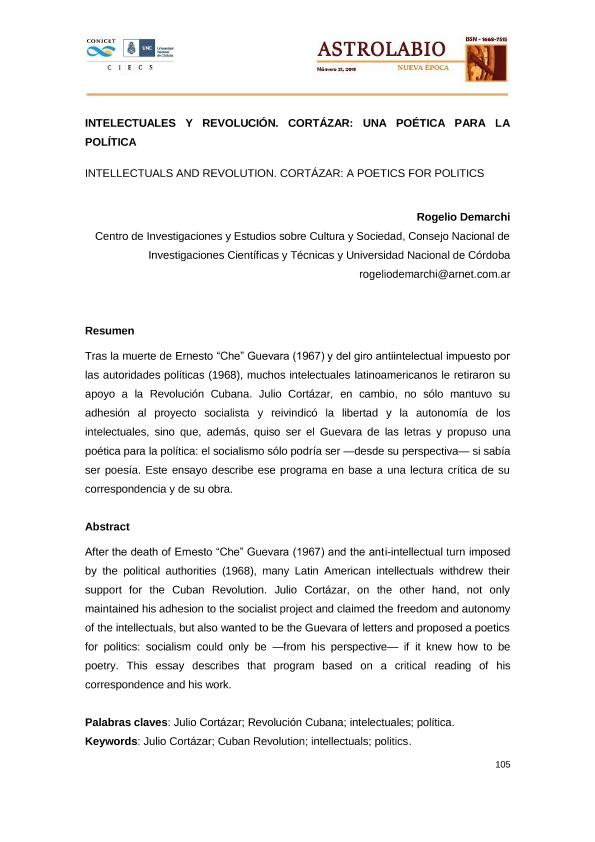Artículo
Tras la muerte de Ernesto “Che” Guevara (1967) y del giro antiintelectual impuesto por las autoridades políticas (1968), muchos intelectuales latinoamericanos le retiraron su apoyo a la Revolución Cubana. Julio Cortázar, en cambio, no sólo mantuvo su adhesión al proyecto socialista y reivindicó la libertad y la autonomía de los intelectuales, sino que, además, quiso ser el Guevara de las letras y propuso una poética para la política: el socialismo sólo podría ser —desde su perspectiva— si sabía ser poesía. Este ensayo describe ese programa en base a una lectura crítica de su correspondencia y de su obra. After the death of Ernesto “Che” Guevara (1967) and the anti-intellectual turn imposed by the political authorities (1968), many Latin American intellectuals withdrew their support for the Cuban Revolution. Julio Cortázar, on the other hand, not only maintained his adhesion to the socialist project and claimed the freedom and autonomy of the intellectuals, but also wanted to be the Guevara of letters and proposed a poetics for politics: socialism could only be —from his perspective— if it knew how to be poetry. This essay describes that program based on a critical reading of his correspondence and his work.
Intelectuales y revolución. Cortázar: Una poética para la política
Título:
intellectuals and revolution. Cortázar: A poetics for politics
Fecha de publicación:
12/2018
Editorial:
Centro de Investigaciones y Estudios sobre Cultura y Sociedad
Revista:
Astrolabio
e-ISSN:
1668-7515
Idioma:
Español
Tipo de recurso:
Artículo publicado
Clasificación temática:
Resumen
Palabras clave:
JULIO CORTÁZAR
,
REVOLUCIÓN CUBANA
,
INTELECTUALES
,
POLÍTICA
Archivos asociados
Licencia
Identificadores
Colecciones
Articulos(CIECS)
Articulos de CENTRO DE INVESTIGACIONES Y ESTUDIO SOBRE CULTURA Y SOCIEDAD
Articulos de CENTRO DE INVESTIGACIONES Y ESTUDIO SOBRE CULTURA Y SOCIEDAD
Citación
Demarchi, Rogelio Gabriel; Intelectuales y revolución. Cortázar: Una poética para la política; Centro de Investigaciones y Estudios sobre Cultura y Sociedad; Astrolabio; 21; 12-2018; 105-128
Compartir




